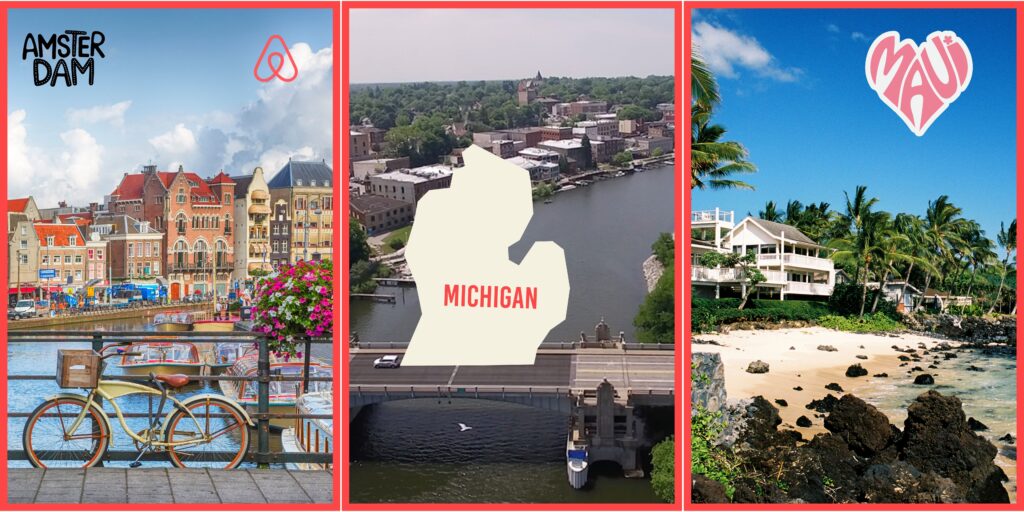Three very different places, Amsterdam, Manistee, and Maui, all grappling with the same core issues: housing shortages, rising rents, and mounting community pressure around short-term rentals. But while the problems are similar, the responses couldn’t be more different. Amsterdam is cracking down with a strict cap and anti-STR rhetoric. Manistee is regulating gently with flexibility. Maui is stalling its ban, rethinking things under economic pressure. These three cities show how differently short term rental regulations can be shaped by local priorities, economic realities, and tourism pressure.
Amsterdam Plans 15-Night STR Cap; Airbnb Blames Hotels, Not Hosts
- Airbnb is pushing back against Amsterdam’s proposal to cut short-term rental limits from 30 to 15 nights a year, calling it “symbolic politics” that won’t solve overtourism.
- Short-term rentals make up less than 2% of overnight stays, according to Airbnb and CoStar data, while the city continues approving new hotels under its “new-for-old” policy.
- Citing a June 2025 survey, Airbnb says most locals agree: nearly 70% blame hotels for the pressure on tourists, and half support converting hotels into housing.
- Airbnb is urging the city to shift tourist tax and marketing funds into housing, stop approving new hotels under the current replacement rules, and collaborate with hosts on balanced policy reforms
- The company also points to its efforts: party bans, a 24/7 hotline, and host education as evidence of responsible engagement and urges a broader, data-driven approach to tourism management.
Snigdha’s Views
- Airbnb recently made a similar argument in its “Overtourism in the EU” report, claiming that hotels, not STRs, are the real drivers of overtourism, accounting for over 75% of tourist nights in cities like Barcelona and Paris.
- Now, in Amsterdam, Airbnb is not just fighting against short term rental regulations with data, something it’s done before, but also stepping into policy advice.
- The company is urging city leaders to redirect tourist taxes and marketing budgets toward housing instead of targeting STRs alone.
- How this plays out in Amsterdam will be important to watch. The city already has a history of strict STR regulation, and the broader debate over housing is only intensifying.
- This moment could shape how other European cities approach STRs, and who gets blamed for tourism pressure.
- For property managers, Amsterdam’s 15-night cap is a clear signal to rethink strategy. That might mean shifting toward mid-term stays, looking at markets with less regulatory friction, or preparing for stricter enforcement in key city zones.
Manistee Passes STR Cap, But Leaves Room in Tourist Zones
- The City of Manistee, Michigan, has passed its new short-term rental ordinance, setting a cap of 165 STRs, or about 5% of all residential properties, outside of designated overlay districts.
- Overlay districts are key areas, like downtown and the beach are exempt from the cap, deliberately leaving space for tourism in its most popular zones.
- The ordinance includes a $100 annual registration fee, a $150 inspection fee every three years, and requires hosts to have insurance and a 24/7 local contact.
- Ownership transfers are allowed, as long as the new owner reapplies within 30 days.
- Violations will be treated as civil infractions, and three violations within two years could lead to the revocation of registration.
- A “Be a Good Neighbor” guide must be posted inside the rental, outlining local rules designed to preserve neighborhood peace and quality of life.
Snigdha’s Views
- Rather than mirror the restrictive playbooks of nearby towns, Manistee is experimenting with a middle path, one that could become a blueprint for others.
- Across Michigan, we’re seeing cities like Ludington and Frankfort take a much tougher stance. Ludington caps STR licenses at just 30, and Frankfort terminates them on ownership transfer; both send a clear “no growth” message.
- Manistee, by contrast, is placing a citywide cap, but allowing more flexibility in high-demand zones.
- This positioning feels deliberate. Manistee is trying to strike a balance, regulating without alienating, and supporting tourism without losing control.
- Fines and requirements are there to keep things compliant, not to drive hosts out, and signals to operators: if you’re willing to play by the rules, there’s room for you here.
- It’s a rare example of a city threading the needle, offering predictability for operators without inviting chaos. Other municipalities navigating the same pressures may soon take notes.
Maui STR Ban Stalls as Officials Weigh Tourism Impact and Local Pushback
- Maui’s plan to phase out more than 7,000 short-term rentals is now on hold, stalled in court, and awaiting further review.
- The courts haven’t ruled yet, and enforcement is on hold. The reason? A mix of economic anxiety, strong advocacy from operators, and a growing realization that Maui’s dependence on visitor spending may be too deep to ignore.
- Local operators quickly pushed back, warning that the phase-out would trigger job losses, shrink tax revenue, and create ripple effects across the island’s small business economy.
- Advocacy groups representing STR owners have also mobilized, organizing testimonies, petitions, and legal challenges. They argue that many of these rentals operate legally, pay taxes, and support year-round jobs in cleaning, maintenance, and guest services.
- Backing these claims, a University of Hawai‘i economic study projected that eliminating STRs in apartment zones could cost Maui $900 million in annual visitor spending and 1,900 local jobs, a hit that would affect not just property owners but the broader economy.
- Although the county earmarked $300,000 for an official economic impact study to guide its decision, no vendor was hired, and the study was never completed.
- Travelers are already pulling back, with some canceling or delaying trips out of uncertainty over whether their booked rentals will still be legal, a trend reported by local outlet Beat of Hawaii.
Snigdha’s Views
- Market uncertainty is already translating into property devaluation: In June, Maui condo prices dropped by as much as 25% year-over-year, with many tying the dip to the looming phase-out of STRs in apartment-zoned areas.
- Jesse G. Wald, a Maui-based real estate broker who has been actively covering Bill 9 developments, noted in a recent video that there appears to be hesitation from the courts, possibly due to concerns over tourism and the local economy.
- Taken together, these signals, market softening, institutional hesitation, and the county’s own stalled impact study, paint a picture of a proposal that may have overreached without fully accounting for economic fallout.
- Whatever Maui decides next may not just resolve a local debate; it could set the tone for how tourism-dependent regions across the U.S. confront housing pressures and vacation rental policy.
Snigdha Parghan is a Content Marketer at RSU by PriceLabs, where she creates articles, manages daily social media, and repurposes news and analysis into podcasts and video content for short-term rental professionals. With a focus on technology, operations, and marketing, Snigdha helps property managers stay informed and adapt to industry shifts.







